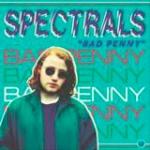
Spectrals Bad Penny
(Wichita/Slumberland)
Louis Jones, the 21-year-old young man behind Spectrals, couldn’t look any less svelte in appearance. His tousled, cinnamon hair and pasty skin depict an introverted Yorkshireman pining for escape, looking outwards to the classical sounds of Western pop with cordial admiration. So any initial thought may imply that Jones doesn’t have the form associated with teen idol worship, but the fact he’s always front and center in every promotional video should indicate he’s essentially portraying what it means to have swagger in his niche – awkwardly dreamy, conspicuously uninterested, and coolly feigning to strum his baby (ahem, guitar).
Inquisitively, today’s indie pop artists are the closest equivalent to yesterday’s emphatic crooner. Looking prim, but slightly disheveled is the new side part and a suit. Spectrals take it one step further by evoking three-strip Technicolor in both image and sound – the usual backdrop to Jones’ epitomical façade is sharply contrasted with a blown out pastel backdrop. Most of the time, it looks like Jones is playing along – while his songs may speak to a drove of neglected femmes, all of them are addressed to his high school sweetheart. Much like a contemporary Perry Como, the starry-eyed romantic in him must be faithful to both the stage and his girl.
The key challenge for indie musicians who cater to retro-fied sounds will always be to strike a fine balance between homage and revision. Which goes without saying that Jones will be prone to facile adjective descriptors – it doesn’t take much imagination to associate the drowsy slide guitar of Lockjaw with a clear sundown, or how the piano strides in Doing Time will whip the crowd into a sock hop frenzy. The strength in Bad Penny, though, lies in how Jones loosely adapts to an idea of what a pop ballad used to sound like without strictly falling into those camps; if anything, his young age comes to the fore when he succumbs to drench most of the production with dense washes of reverb, which in turn obscure his undeniably English croon.
If Jones tried to detach himself from Brill Building pop, then he unmindfully stumbles upon space age pop. With instruments attributed to the exotica movement of the mid-fifties (loungy guitar riffs, bongos), You Don’t Have to Tell Me sounds positively high class, in what could very well typify a 21st century indie rendition of Martin Denny, sans the bird call whistles. The most blatant evidence can be found in Many Many Returns, in which Jones steadily downplays a nu jazz groove, ready to bust a Les Baxter record in his bachelor pad and ponder the all-important question: stirred or not stirred?
All these stylistic alterations merely highlight what is, in essence, a finely sewn jangle pop record. Which is also what salvages Bad Penny from its repetitious nature, a trait Jones disguises by playing slightly detuned chords all the way through its downhearted musings. Especially in its own field, Spectrals’ decision to write cheekily bubbly melodies over exceedingly doused distortion is a welcome contrast from the current crop of Slumberland artists vying for victory in the noise war. If only Jones would also add some color to his verbatim accounts to match his minimal pop songs, then we would have a real contender in our hands.
28 October, 2011 - 06:42 — Juan Edgardo Rodriguez